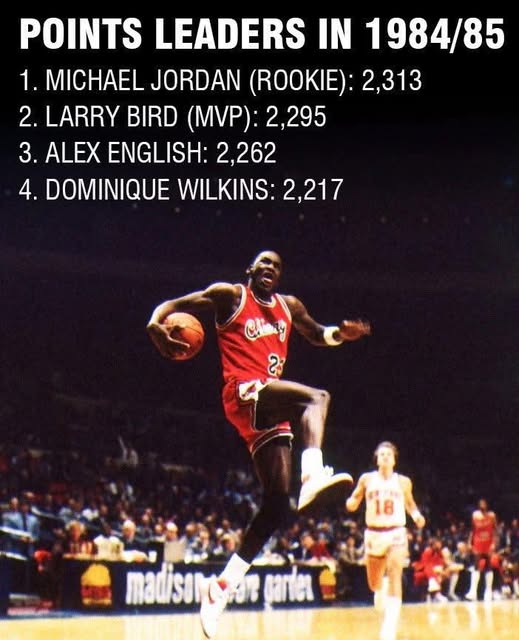April 17, 1985, marks a historic milestone in NBA history — the day Michael Jordan was officially crowned the Rookie of the Year after an electrifying debut season that redefined what a rookie could accomplish. More than just a symbol of promise, Jordan’s rookie campaign was a revelation. He not only led the Chicago Bulls in points, rebounds, assists, and was second in blocks but also topped the entire league in total points scored. This remarkable feat, achieved by a player in his very first year, foreshadowed the legendary career that would forever alter the landscape of basketball.
When Michael Jordan stepped onto the court as a rookie during the 1984-85 NBA season, few could have anticipated the seismic impact he would have on the league. Drafted third overall by the Chicago Bulls in the 1984 NBA Draft, Jordan arrived with impressive college credentials from the University of North Carolina, where he had already won a national championship and earned numerous accolades. Yet, the leap from college star to professional basketball icon was never guaranteed. The NBA was filled with established veterans and rising stars, making it a daunting arena for any newcomer.
Jordan’s rookie season was more than just a statement; it was a comprehensive declaration of dominance. Averaging 28.2 points per game, he led the entire NBA in total points scored, a rare and nearly unprecedented accomplishment for a rookie. The sheer volume of his scoring was breathtaking, with Jordan’s explosive athleticism, unmatched work ethic, and sheer competitive firepower dazzling fans and confounding opponents alike. But points were just the beginning.
Beyond scoring, Jordan exhibited an all-around game that made him the heartbeat of the Bulls. He led his team in rebounds, pulling down 6.5 boards per game, an impressive total for a guard, demonstrating his tenacity and ability to battle inside despite his 6-foot-6 frame. His average of 5.9 assists per game revealed his emerging playmaking skills, showing that he was more than a scorer — Jordan was a complete basketball player capable of making his teammates better.
Defensively, Jordan was a force to be reckoned with, ranking second on the Bulls in blocks, an uncommon stat for guards at the time. His defensive intensity, athleticism, and instincts allowed him to disrupt offenses and change the course of games. He quickly earned a reputation as a lockdown defender, which would later translate into multiple Defensive Player of the Year candidacies. His rookie season hinted at the two-way excellence that would become his trademark.
The significance of Jordan’s Rookie of the Year award extends beyond individual statistics. It was a transformational moment for the Chicago Bulls franchise, which had struggled to find consistent success before Jordan’s arrival. The Bulls finished the 1984-85 season with a 38-44 record — a vast improvement from previous years — and made the playoffs for the first time in six seasons. Jordan’s leadership and dynamic play gave the Bulls renewed hope and helped lay the foundation for their eventual dynasty.
Jordan’s impact reached far beyond Chicago. His rookie campaign revitalized interest in the NBA, which during the early 1980s was grappling with declining TV ratings and limited mainstream appeal. His charisma, flair, and highlight-reel dunks electrified audiences, turning casual viewers into passionate fans. Michael Jordan was not just a player; he was a marketing phenomenon who soon became the global face of basketball.
Off the court, Jordan’s Rookie of the Year season was the beginning of a storied legacy. He was awarded the honor unanimously, a testament to the undeniable impression he made on coaches, media, and fans. This accolade would be the first of many — including six NBA championships, five MVP awards, and 14 All-Star selections — all testifying to a career that would inspire generations.
Looking back 40 years, Jordan’s rookie season is frequently cited as one of the greatest rookie campaigns in NBA history. Few players have matched his combination of scoring dominance, all-around production, and immediate impact. Players like LeBron James, Shaquille O’Neal, and Larry Bird all had impressive rookie years, but none matched the raw statistical and cultural impact Jordan brought to the game right away.
It’s also crucial to consider the era in which Jordan debuted. The mid-1980s NBA was characterized by tough, physical play and a slower pace than today’s game. For a rookie to dominate scoring and contribute in every facet of the game amid such an environment was extraordinary. Jordan’s ability to thrive against seasoned professionals underscored his exceptional talent and competitive drive.
Jordan’s rookie numbers were staggering: 2,313 total points scored during the season, leading all rookies and veterans alike. His 28.2 points per game led the Bulls by a wide margin and was second only to Adrian Dantley in the league for scoring average. But it wasn’t just scoring; his 480 rebounds and 435 assists placed him at the top for his team in those categories as well. On defense, he swatted away 109 shots, showing defensive versatility uncommon for guards.
What made this performance even more remarkable was that Jordan was often the primary offensive option from day one. Unlike many rookies who ease into the league as role players, Jordan carried the load for the Bulls night after night. His relentless work ethic and refusal to accept anything less than excellence became immediately evident. Coaches and teammates praised his leadership, competitive spirit, and unyielding desire to win.
Jordan’s Rookie of the Year award was also a harbinger of the Bulls’ rise to prominence. Over the next decade, Chicago transformed from a struggling franchise to a global powerhouse, capturing six NBA championships during the 1990s. The foundation for that success was laid on April 17, 1985, when Jordan was recognized as the league’s top rookie — the first step in a journey to basketball immortality.
The cultural impact of Jordan’s rookie season also can’t be overstated. He quickly became a marketing juggernaut, signing endorsements that included Nike, Gatorade, and McDonald’s. His Air Jordan sneakers revolutionized basketball footwear, creating a global brand that transcended sports. Jordan’s charisma and style helped basketball gain international appeal and inspired countless young athletes worldwide.
Reflecting on this milestone 40 years later offers not only a glimpse into the beginning of a legend but also a reminder of how one player’s talent and determination can change the course of a sport. Michael Jordan’s rookie season was a perfect storm of athleticism, skill, and timing. It was a launchpad for a career that would become the gold standard in basketball excellence.
In summation, 40 years ago today, Michael Jordan earned the NBA Rookie of the Year award not simply by scoring points but by embodying a level of excellence and leadership rarely seen in a first-year player. He led the league in total points, dominated the Chicago Bulls across every major statistical category — points, rebounds, assists, and blocks — and transformed his team’s fortunes. Jordan’s rookie year was the prologue to an unparalleled career that would elevate the game and inspire millions.
As we look back on that seminal season, the significance remains clear: April 17, 1985, was the day the NBA announced the arrival of Michael Jordan — not just a rookie of the year but a future Hall of Famer, cultural icon, and arguably the greatest basketball player to ever grace the hardwood. The legacy born on that day continues to influence basketball and sport worldwide, reminding us that greatness can emerge spectacularly, even from the very first step.



